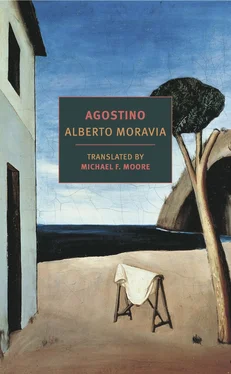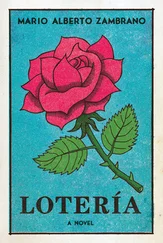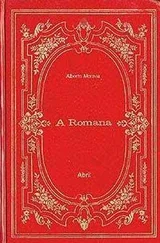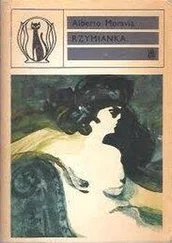As soon as they were close to shore, the young man leapt agilely onto the seat and, grabbing hold of the oars, pushed Agostino away, forcing him to sit next to the mother. She immediately put her arm around his waist, an unusual and, at the moment, unjustified gesture, asking him “How are you doing? Are you happy?” in a tone that did not seem to require an answer. She looked exceedingly happy and burst into song, another unusual occurrence, in a melodious voice with pathetic trills that made Agostino’s skin crawl. While she was singing, she continued to hug him to her side, drenching him with the water seeping from her bathing suit, which her acrid, violent animal warmth seemed to heat and turn to sweat. And so, with the woman singing, the annoyed son surrendering to her embrace, and the young man rowing — a picture Agostino found contrived and false — they came ashore.
The next day, the young man reappeared. The mother brought Agostino along, and the same acts as the day before were repeated. Then, after a two-day interruption, there was another boat ride. Finally, having apparently achieved a certain intimacy with the mother, the young man began coming every morning to pick her up, and every morning Agostino was forced to accompany them and witness their conversations and frolicking in the water. These outings so repelled him that he sought any number of excuses to avoid them. Sometimes he would disappear and not come back until the mother, after calling him and looking for him for what seemed like hours, forced him to show his face not so much through her scolding as through the feelings of pity her annoyance and disappointment provoked in him. At other times he would start sulking on the boat, hoping the two of them would understand and leave him alone. But in the end he was always weaker and more sympathetic than his mother or the young man. For them, it was enough that he be there. His own feelings, he quickly came to see, were of little concern to them. So despite his best efforts, the outings continued.
One day Agostino was sitting on the sand behind the mother’s lounge chair, waiting for the white boat to appear on the horizon and the mother to wave a greeting and call to the young man by his name. But the usual hour of his appearance had come and gone, and the mother’s disappointed and annoyed expression revealed that she had given up hoping for his arrival. Agostino had often wondered how he would feel in such an event, and he had always thought his joy would have been at least as great as his mother’s dejection. He was surprised to discover, instead, that all he felt was empty disappointment, and he realized that the humiliation and repulsion of the daily outings had almost become his reason for living. So more than once, out of a murky, unconscious desire to make his mother suffer, he asked her whether they were going out to sea that day for their usual ride. And every time she gave the same answer: that she didn’t know, but in all likelihood they would not be going today. She was sitting in her lounge chair, a book open on her knees, but she wasn’t reading. With the gaze of a person searching for something in vain, her eyes often migrated to the sea, which meanwhile had filled with bathers and boats. After spending a long time behind her chair, Agostino crawled through the sand to face her and repeat in what even he knew was a nagging and almost sarcastic voice, “I can’t believe it! We’re not going out to sea today?” Maybe the mother detected the sarcasm and his desire to hurt her. Or maybe these rash words were enough to cause a pent-up irritation to erupt. She raised a hand and gave his cheek a sudden backhand slap, a blow that felt soft, almost accidental and regretful. Agostino didn’t say a word. He did a somersault on the sand and walked off, making his way down the beach, head lowered, in the direction of the cabins. “Agostino… Agostino,” he heard her calling over and over again. Then the calls stopped, and turning around he thought he could discern, amid the many boats crowding the sea, the young man’s white pattino. But by then he had stopped caring. With the same sharp sense of discovery as a man who has found a treasure and sneaks away to hide it and gaze upon it at his leisure, he ran to be alone with her slap, so new to him as to seem unbelievable.
His cheek was burning, and his eyes welled up with tears that he struggled to hold back. Fearing they would overflow before he had found a refuge, he ran hunched over. The bitterness that had been building during the long days when he was forced to accompany the young man and the mother was now being murkily disgorged. He felt as if, by unburdening himself with a good cry, he would finally understand something about these obscure events. When he reached the cabin, he hesitated for a moment, looking for a place to hide. He figured the easiest thing would be to take refuge inside. The mother would be out at sea, and no one would disturb him. Agostino raced up the steps, opened the door, and without closing it entirely went to sit on a stool in a corner.
He huddled with his knees to his chest and his head against the wall. Taking his face between his hands, he began to cry in earnest. Between his tears he could feel the sting of that slap. He wondered why such a harsh blow had felt so irresolute and soft. The burning sense of humiliation it provoked rekindled and even amplified a thousand unpleasant sensations that he had felt over the past few days. The one that returned to him most insistently was the memory of his mother’s belly clothed in the wet fabric, pressed against his cheek, trembling and agitated by a lustful vitality. In the same way that beating old clothes raises big clouds of dust, that unjust blow, unleashed by the mother’s impatience, reawakened in him the distinct sensation of her belly pressed against his cheek. At times that sensation seemed to replace the stinging left by the blow. At other times the two blended together, throbbing and burning as one. But while he understood the persistence of the slap, rekindling on his cheek every so often like a dying fire, the reasons for the tenacious survival of that distant sensation remained obscure. Of the many, why had this one remained so indelible and so vivid? He had no answer. But he felt that as long as he lived, he would only need to recall the moment to feel against his cheek once more the throbbing of her belly and the moist coarseness of her wet bathing suit.
He cried softly so as not to disturb the painful workings of memory. As the tears slowly but steadily trickled from his eyes, he rubbed them with his fingertips against his moist skin. A sparse and sultry darkness filled the cabin. He suddenly had the feeling the door was opening, and he almost hoped his mother, repentant and affectionate, would place one hand on his shoulder and, with the other, take him by the chin and turn him around to face her. He was already preparing his lips to whisper “Mamma,” when he heard footsteps enter the cabin and the door close behind them, but no hand came to rest on his shoulders or pat him on the head.
Then he looked up and stared. He saw a boy who appeared to be about his age standing by the door, in the attitude of a lookout. He was wearing shorts with rolled-up cuffs and a worn-out sleeveless T-shirt with a big hole in the back. A thin blade of sunlight shone through the cracks between the boards of the cabin and burnished a head of tight copper-colored curls above the nape of the neck. Barefoot, his hands on the doorjamb, the boy scoured the beach and didn’t seem aware of Agostino’s presence.
Agostino dried his eyes with the back of his hand and started to say, “Hey you, over there. What are you looking for?” But the other boy turned and gestured to him to keep quiet. Turning around he revealed an ugly freckled face whose most remarkable feature was his glowering blue eyes. Agostino thought he recognized him. He was a son of a lifeguard or boatman. He must have seen the boy pushing off the boats or doing something like that near the beach, he thought.
Читать дальше












